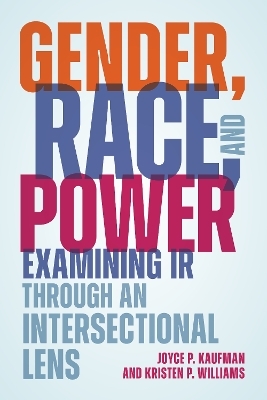
Gender, Race, and Power
Rowman & Littlefield (Verlag)
978-1-5381-8211-6 (ISBN)
- Lieferbar (Termin unbekannt)
- Versandkostenfrei
- Auch auf Rechnung
- Artikel merken
There are currently many books and articles that look at aspects of gender or race and international relations but none that embrace a broad intersectional approach (in terms of both gender and race that goes beyond a postcolonial perspective) to the study of the field. After introducing the approach, Kaufman and Williams then proceed through critical issues in international relations and the ways in which an intersectional approach that examines race, gender, class, ethnicity, and power can help us arrive at better explanations for these IR issues.
The approach in this text builds on what many of the feminist IR theorists called for to address traditional issues such as security and war. Feminist IR theorists, led by scholars such as Ann Tickner and Cynthia Enloe, asked the question “Where are the women?” as a guiding principle. Feminist approaches to IR have been a part of the field for decades, but it is only fairly recently that students of IR have broadened the approach to the field to incorporate the dimensions of race, ethnicity, and class as well as gender. Thus, we ask questions like: How does gender matter for understanding war and peace? How does race matter? Where are the men? What is intersectionality in IR? How does an intersectional approach change/broaden our understanding of international relations?
Joyce P. Kaufman is professor emerita of political science at Whittier College and Director of the Women, Peace and Security Program of the Institute of World Affairs. She is the author of numerous books, articles and papers on women and war, U.S. foreign and security policy, and international relations. She received her B.A. and M.A. from New York University and her Ph.D. from the University of Maryland.Kaufman is the sole author of Introduction to International Relations, 3rd edition (Rowman and Littlefield, 2022); A Concise History of United States Foreign Policy, 5th edition (Rowman and Littlefield, 2021); andNATO and the Former Yugoslavia: Crisis. With Andrew Dorman she was co-editor of Providing for National Security: A Comparative Analysis (Stanford University Press, 2014); and The Future of Transatlantic Relations, (Stanford University Press, 2011) and contributed original chapters to both. She is also the author of a number of original articles including “Women and Political Violence in Northern Ireland: Newspaper Imagery during the Troubles,” Women’s History Review, 30:7 (2021); “The U.S. and NATO in a Trump Administration: Lessons of the Past and Prospects for the Future,” International Affairs, 93: 2 (2017) 251-66; and “NATO and the Former Yugoslavia,” in The Journal of Conflict Studies, Winter 2000. Kristen P. Williams (PhD, UCLA) is professor of political science at Clark University. She is the author, co-author, and co-editor of several books, chapters, and journal articles on women/gender and war, nationalism and ethnic conflict, and hegemony and international relations. Williams is the sole author of Despite Nationalist Conflicts: Theory and Practice of Maintaining World Peace (Praeger, 2001). With Neal G. Jesse, she co-authored Identity and Institutions: Conflict Reduction in Divided Societies (SUNY, 2005) and Ethnic Conflict A Systematic Approach to Conflict (CQ Press, 2011). She co-edited Beyond Great Powers and Hegemons: Why Secondary States Support, Follow or Challenge, (Stanford University Press, 2012). Her academic articles have been published in journals, including Political Psychology, International Feminist Journal of Politics, Journal of Research in Gender Studies, and International Politics, and Oxford Bibliographies in International Relations. Her most recent publication is a chapter in the edited volume, the Oxford Handbook of Gender, War and the Western World since 1600(Oxford University Press, 2020).
List of Text Boxes
Preface
List of Abbreviations
Introduction
Chapter 1: Intersectionality and IR
Introduction: Starting with the War in Ukraine
Intersectionality and IR
Mainstream IR Theories: Realism, Liberalism, and Constructivism
Critiques of Mainstream IR: Race, Gender, and Empire—and Intersectionality
Conclusion: Overview of Chapters 2-6
Chapter 2: Intersectionality and Issues of War, Peace, and Security
Introduction
What is War?
What is Peace?
War and Peace from an Intersectional Perspective: Human Security
The Women, Peace, and Security Agenda and UNSCR 1325
Critiques of UNSCR 1325: Intersectionality Matters
Intersectional Analysis: Northern Ireland as a Case Study
Conclusion
Chapter 3: Intersectionality, Human Rights, and Humanitarian Intervention
Introduction
Human Rights as a Concept and a Norm
Women and Their Impact on the UN Charter and UDHR
UDHR and Human Rights from an Intersectional Perspective
Applying an Intersectional Analysis: CEDAW as a Case Study
Humanitarian Intervention and the Responsibility to Protect (R2P)
Conclusion
Chapter 4: Intersectionality, the Global Economy, and Issues of Development
Introduction
IR Approaches to the Global Economy
Gendering Development: WID, WAD, and GAD
Global Health and Economic Development: COVID-19 as a Case Study
Conclusion
Chapter 5: Intersectionality and the Environment
Introduction
Development and Evolution of International Environmental Politics
International Relations and the Environment
Intersectionality and International/Global Environmental Politics
Case Study: Intersectionality and Climate Change
Gendering Climate Change and Global Governance
Conclusion
Chapter 6: Examining IR from an Intersectional Perspective: Lessons Learned
Introduction
Answering the Questions
Intersectionality and the Case Studies
Conclusion: The Challenges and Possible Next Steps
Glossary
About the Authors
| Erscheinungsdatum | 25.09.2024 |
|---|---|
| Zusatzinfo | 17 BW Illustrations, 1 Maps |
| Verlagsort | Lanham, MD |
| Sprache | englisch |
| Maße | 158 x 236 mm |
| Gewicht | 426 g |
| Themenwelt | Geschichte ► Teilgebiete der Geschichte ► Wirtschaftsgeschichte |
| Sozialwissenschaften ► Politik / Verwaltung ► Europäische / Internationale Politik | |
| Sozialwissenschaften ► Soziologie ► Gender Studies | |
| ISBN-10 | 1-5381-8211-4 / 1538182114 |
| ISBN-13 | 978-1-5381-8211-6 / 9781538182116 |
| Zustand | Neuware |
| Haben Sie eine Frage zum Produkt? |
aus dem Bereich


